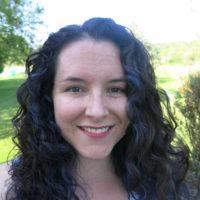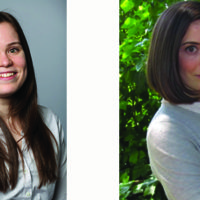Highlight on Alum Madeline Smith
 Madeline E. Smith is a faculty member in the Department of Computer Science at Colgate University. She is currently teaching User-Centered Design and Introduction to Computing as well as conducting research on the use of communication technology for maintaining social and family relationships. Madeline is also a PhD Candidate studying Technology & Social Behavior at Northwestern University, a program combining Computer Science and Communication Studies. Her dissertation focuses on students’ use of communication technology and family communication during the stressful transition to college and is supported by a National Science Foundation Graduate Research Fellowship and grants from Northwestern University. She previously earned a M.S. in Information Science from Cornell University, B.S. in Computer Science from Ithaca College, has taught courses at DePaul and Northwestern Universities, and worked at Microsoft Research. Her research currently focuses on the use and design of social technologies to support interpersonal relationships.
Madeline E. Smith is a faculty member in the Department of Computer Science at Colgate University. She is currently teaching User-Centered Design and Introduction to Computing as well as conducting research on the use of communication technology for maintaining social and family relationships. Madeline is also a PhD Candidate studying Technology & Social Behavior at Northwestern University, a program combining Computer Science and Communication Studies. Her dissertation focuses on students’ use of communication technology and family communication during the stressful transition to college and is supported by a National Science Foundation Graduate Research Fellowship and grants from Northwestern University. She previously earned a M.S. in Information Science from Cornell University, B.S. in Computer Science from Ithaca College, has taught courses at DePaul and Northwestern Universities, and worked at Microsoft Research. Her research currently focuses on the use and design of social technologies to support interpersonal relationships.
Q: What has been your path that brought you to this point in your career? What made you choose a career in academia?
I was not one of those kids who always knew what I wanted to do when I grew up. I had always been drawn to math and sciences where I could use logic and prove if my answers were correct. I was also involved in many extracurricular activities and enjoyed working with and helping other people. I chose a career in academia when I (eventually) realized it would allow me to combine my interests in both technology and people!
Although I took a computer science course my freshmen year of college, I did not consider pursuing CS any further because I incorrectly assumed that would mean a career writing code alone in a cubicle. Fortunately, I was at a small college with wonderful professors who took the time to get to know and mentor their students. Those professors encouraged me to take more computer science classes, get involved in interdisciplinary research, apply for scholarships and awards, travel to present my research, and pursue graduate school.
During graduate school, I continued to work on interdisciplinary research projects and was introduced to new fields of study. I became involved in the international HCI research community, as a conference student volunteer, research manuscript reviewer, and SIGCHI committee member. This gave me the opportunity to travel the world with other HCI researchers, some of whom have turned into my best friends!
Q: Tell us a bit about your research on the use of social technologies for maintaining relationships. What are the most exciting future opportunities and research challenges in your area?
My research is at the intersection of computer science and social sciences. I use both quantitative and qualitative research methods to study how people use social technologies. My goal is to understand the effects of technology use on people’s lives and to design new technologies that better support their needs.
My current work focuses on family communication during students’ transition from high school to college. Social technologies that are popular today allow college students who have moved away from home to remain in nearly constant, long-distance communication with their families. This is a major change from a few decades ago when college students were only able to communicate with their families by writing letters, visiting in person, or calling from a pay phone. My project aims to understand whether this increase in communication is helping students — by allowing them to get social support from their families — or hurting them — by enabling them to continue relying on their families, rather than becoming more independent.
It is an exciting time to be studying social technologies, as new social media and digital communication methods are becoming available and gaining popularity regularly. This also presents a challenge for researchers in this area, as the landscape is constantly changing and researchers must work quickly to keep up with current trends.
Q: What do you enjoy most about your career right now?
My career is really just getting started and I am so excited to see what the future holds! One of the things I love most about academia is the freedom to choose what I want to research. While I am continuing to work on several ongoing projects, I have the flexibility to start a new project anytime the opportunity presents itself, such as when a student or colleague proposes a new collaborative project. In addition to my own research, being a university professor allows me to teach interesting classes and work with brilliant students and colleagues. I chose to work at a Small Liberal Arts College (sometimes called SLAC) where I would have the opportunity to teach outside of the computer science department as well. I am looking forward to teaching interdisciplinary courses on topics such as Ethical Issues in Computing and Growing Up Online.
Q: How have you been involved in CRA-W? What has this involvement meant to you?
I have been involved with CRA-W for the last decade. I have participated in a number of programs, from being awarded a CREU grant to work on my very first research project as an undergraduate to participating in a recent Early Career Mentoring Workshop. Receiving that first CREU grant allowed me to get involved with interdisciplinary research early in my career, which is what convinced me to pursue computer science in the first place! Each of the CRA-W workshops I have participated in since — Grad Cohort, Discipline Specific (CHIMe), and Early Career Mentoring — have provided useful career advice and introduced me to new mentors and friends.
Q: How do you balance work and life? What do you enjoy doing when you
aren’t working?
I love spending time with friends and family and traveling, especially when I am able to travel with friends and family members! As a professor, my schedule is flexible when I am not teaching classes. I take advantage of that and try to travel during every break I get. I am fortunate that some of my best friends work in the same field as I do and frequently attend the same research conferences. We always try to add on one or two personal days to the end of each work trip so we can sightsee together. When I’m at home, I enjoy baking, exploring the area I live in, and my guilty pleasure (binge-watching TV shows).
The flexibility to do my work when and where I want can be fantastic, but it can also make it very challenging to find a balance between work and life. I know that I do better work when I am taking care of myself and taking time off, but it can be difficult to “turn off” the work part of my brain and fully enjoy myself during other activities. I have found it useful to make a plan ahead of time and stick to it, such as deciding to work on the plane but focus on enjoying myself the rest of the trip. I also aim to take at least one trip every year without my laptop and without checking my email (the key to this is letting your colleagues know and getting as much done ahead of time as possible, so you can fully relax while you are away).
Q: Do you have any advice for women at any stage of their careers?
Don’t allow yourself to be limited by stereotypes!






